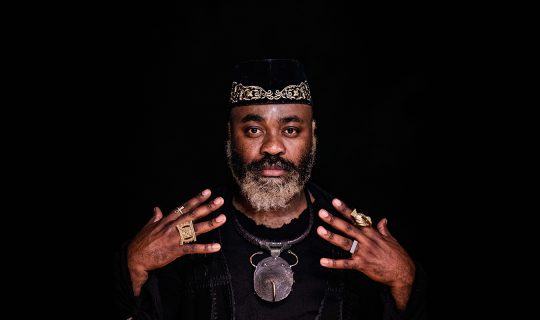October 17, 2012
Possessed of perhaps the most famous last name in jazz, saxophonist Ravi Coltrane has nevertheless resisted premature canonization since emerging on the scene 15 years ago. Over the course of five albums, he built a reputation as a thoughtful and creative improviser, aware of history (both his family’s, and jazz’s) but unwilling to let it crush him. Now, he’s made his Blue Note debut with album number six, Spirit Fiction, which showcases his current band as well as a reunited group he first recorded with over a decade ago, on 2000’s From the Round Box.
The first and last tracks on Spirit Fiction feature soprano sax, almost like a framing device for everything in between. Was that deliberate?
Yes, it was, but you left out one part: the middle. There’s a soprano track right in the middle of the sequence, too. Originally I was going to bookend the album with the two improv tracks, “Roads Cross” and “Cross Roads.” One was gonna start the record, the other was gonna end the record, and “Marilyn & Tammy” was gonna split the record, but it didn’t feel like a natural enough progression, really. It felt like an encapsulation, and bookends will often give you that. So yeah, the first track, “Roads Cross,” is improv, the middle track, “Cross Roads,” is improv, and we end with “Marilyn & Tammy,” which is another thing.
Joe Lovano produced the album; what did he bring to that role?
Well, Joe is not only a master musician, he’s also one of the most efficient studio recording artists that we have today. He understands what needs to be done to get the record done, to keep a certain momentum and to keep things fresh. And he can bring all this great history, yet also a great intuition. He can really see how things need to be shaped, and what’s going to be the most effective. He brings a lot to the table.
He plays on two tracks, also; how would you say you two interact as players, and have you learned from him?
[laughs] I’ve been hanging out with Joe since 1988, 1987 maybe: I’ve played many sessions with him, I took lessons with him, I’ve hung out at his crib, he’d get on the drums and I’d play saxophone, he’d say “Try it this way, think about it this way.” That was the early ’90s. So he’s an ongoing presence in my musical life and my life, generally speaking. You know, we’re good friends. So I’ll always learn something from Mr. Lovano.
How much does this material change from studio to stage?
Well, you know, it can be very similar or you can just allow things to organically take place. When we approached these recordings, we were literally just trying to find as much common ground between the players, between what happens in that room—sometimes you’re not able to put the same type of energy into a piece in the studio that you might on a stage. It’s like, well, we have this piece and it should only be about four minutes long, because that’s how it should sit on this record. That’s gonna dictate certain parameters—you’ll have a few things you can do. On the bandstand, those parameters can be totally different. You can play the same song for 20 minutes. The energy and character of the entire piece can be totally changed. So you’re really just trying to deal with the material in the moment, in real time, you know?
Why the two bands? Was that the concept going in, or were you working with one group and decided you needed to change the sound, or what?
Well, I’ve always recorded my records in these chunks, in different studio sessions. We don’t go in one day and say “Okay, we’re going to have the record done by six PM tonight, and it’ll be turned in to the record company tomorrow.” We do sessions, and you try to have some agendas and goals for those sessions and get some things done. I knew that I was going to record my quartet for this album, but I also knew that at some point I wanted to reconvene this quintet that I recorded with back in 2000, on my second record, From the Round Box. That’s the band with Geri Allen, Ralph Alessi, James Genus and Eric Harland, and these are all people that I’ve continued to have musical associations with since that recording, and before that. [Because] the material worked together, and the bands contrasted with each other enough, yet allowed for some continuity, I thought that was a nice thing to add to this record.
Onstage, you engage with the audience in a way that neither of your parents did; the music has less…intensity. Is that deliberate?
[laughs] There’s so many things that I do that my parents most likely never did, and vice versa. That’s the important thing: I’m not trying to emulate them, as they were not trying to emulate anyone else. They were trying to be themselves, and that made their music stronger and more potent. As soon as you start to go in that direction of “Well, I should try to be more like this, or play more like this, or do more like that,” then yeah, you’re kind of losing yourself before you even start. So what I do onstage is what I do. That’s the way you’ve got to be.
Do you think a willingness to engage with the crowd and be an entertainer is something jazz needs today?
Well, perhaps. I’m not that willing to be an entertainer [laughs]. I’m not trying to please anyone. I’m literally just trying to be myself and have a good time. This is hard work, but it’s supposed to be joyous work, it’s supposed to be fun work. So if I can’t get onstage and enjoy myself and express myself in a way that I feel is natural to how I operate, then there’s really no point. The relationship between the band and the audience, I think, is always an important relationship to cultivate to some degree. We’re in this together, right? We’re all in this room, dealing with this one element together. The players and the audience, I try not to see as two separate things. I just see it as a bunch of people in a room, a few of whom are playing instruments.
Your father famously made only one album for Blue Note. Are you planning on sticking around longer than that?
Well, who knows? Time will tell. I hope so. I can always say that much.







